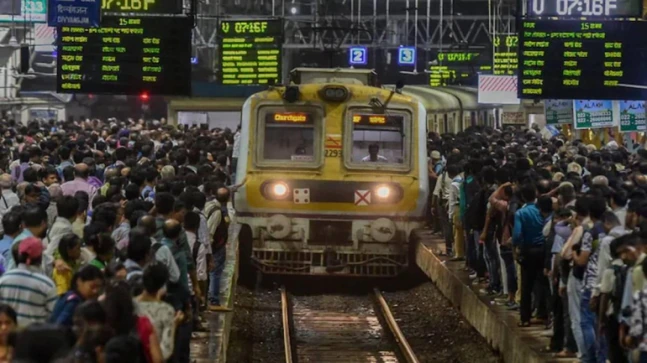
[ad_1]
The Bombay High Court on Tuesday said that a calculated risk of boarding an overcrowded train would not amount to a “criminal act”. The court was hearing a plea filed by a Mumbai man who sustained injuries after falling from a crowded local train over a decade ago.
The high court directed the Railways to give a compensation of Rs 3.10 lakhs to the injured passenger, Nitin Hundiwala. He was earlier denied compensation by a railway tribunal.
BOMBAY HC RULING
The bench of Justice Bharti Dangre said, “The local trains in Mumbai, which are often called ‘Lifeline of the City’, has a huge number of the city’s inhabitants relying on them to get to work or other destinations… Even, it is not unknown, for the residents of Mumbai who commute through railways to undertake risk at some point of time, in order to reach their destinations… the calculated risk surely cannot amount to a ‘criminal act’.”
Justice Dangre said that such a fall and injury as sustained by Hundiwala would be covered by the definition of ‘untoward incident’ under Section 123(c)(2) of the Railways Act. ‘Untoward incident’ is another term which is defined in the said chapter, and it include the accidental falling of any passenger from any train, carrying passengers.
On the issue of the criminal act, Justice Dangre noted that ‘criminal act’ is not defined in the Railways Act, but the two provisions in the Act which impose penalty for the offences under the Act are Sections 154 and 156 of the Railways Act.
Section 154 criminalises the act of endangering the safety of persons travelling by railway by rash or negligent act or omission. Section 156 deals with entering into a compartment reserved or resisting entry into a compartment not reserved.
“A careful reading of the two provisions would lead to an irresistible conclusion that only the two acts described above which endanger safety of persons travelling by railway or travelling on step or engine of train are covered. If in daily chores, a passenger attempts to gain entry into an overcrowded train and is pushed by other passengers, resulting in his fall, there is no reason why such an incident cannot fall within the ambit of an ‘untoward incident’,” Justice Dangre said.
With this, Justice Dangre said, “The Tribunal has, therefore, erred in making the case of the applicant fall within the scope of the ‘Criminal Act’…”
Justice Dangre also saw that Hundiwala’s employer had said that he did not attend duty after the accident, meaning thereby, that he is unable to take the strenuous journey, which has incapacitated him from long walks, climbing staircases etc. which is imperative for travelling from his place of residence to his workplace.
THE INJURY
On November 23, 2011, Hundiwala, a resident of Dahisar area of Mumbai, fell from a fast Virar local train, which was overcrowded, while on the way home from work. He was standing on the edge of the train. He fell from the moving train and sustained serious injuries to his head and thigh. He was 70-years-old at that time.
Hundiwala was hospitalised for 14 days and spent around Rs 2 lakhs. Further, he stated that he is unable to walk long distances, can not lift heavy things, is unable to climb staircase or squat, can not sit crossed leg for a long time.
He sought compensation of Rs 4 lakhs, which was rejected by the Railway Claims Tribunal’s Mumbai Bench. He filed an appeal in the high court. The tribunal had accepted the contention of the Railways that Hundiwala had resorted to an “imprudent and criminal act” of boarding a running local train.
[ad_2]
Source link